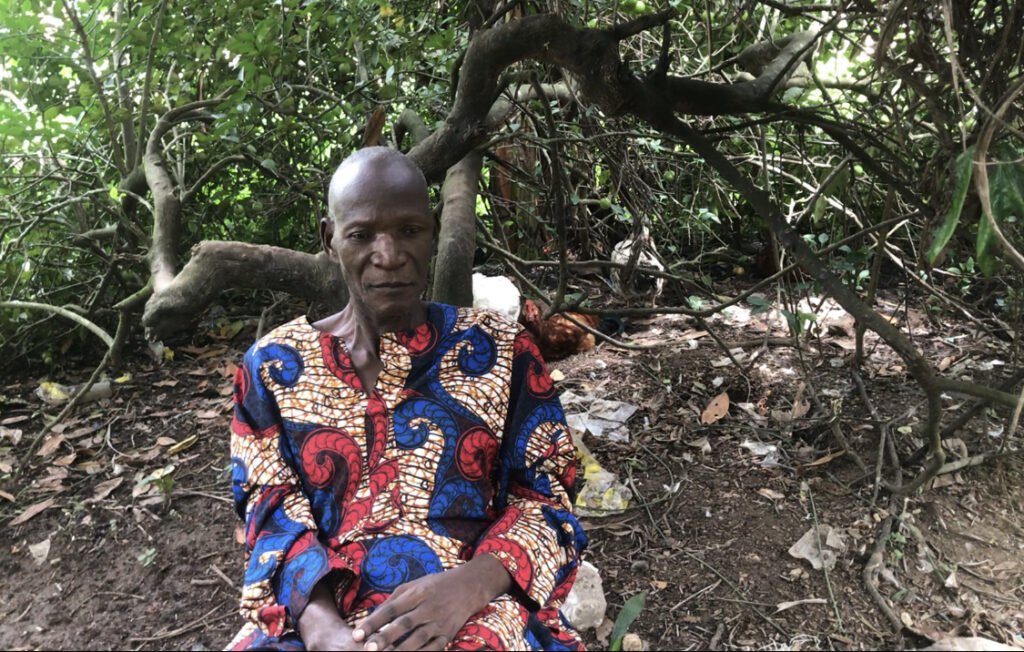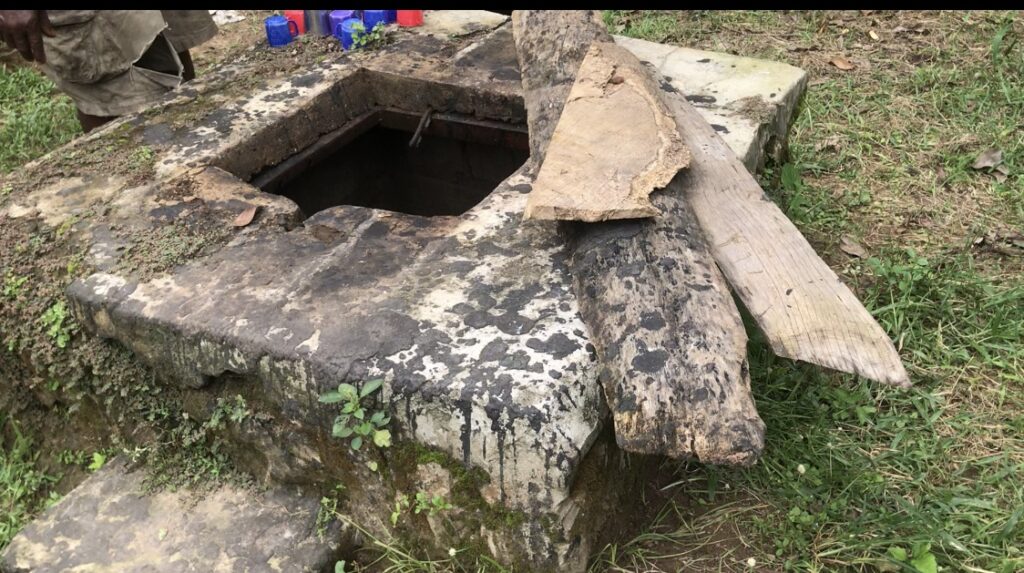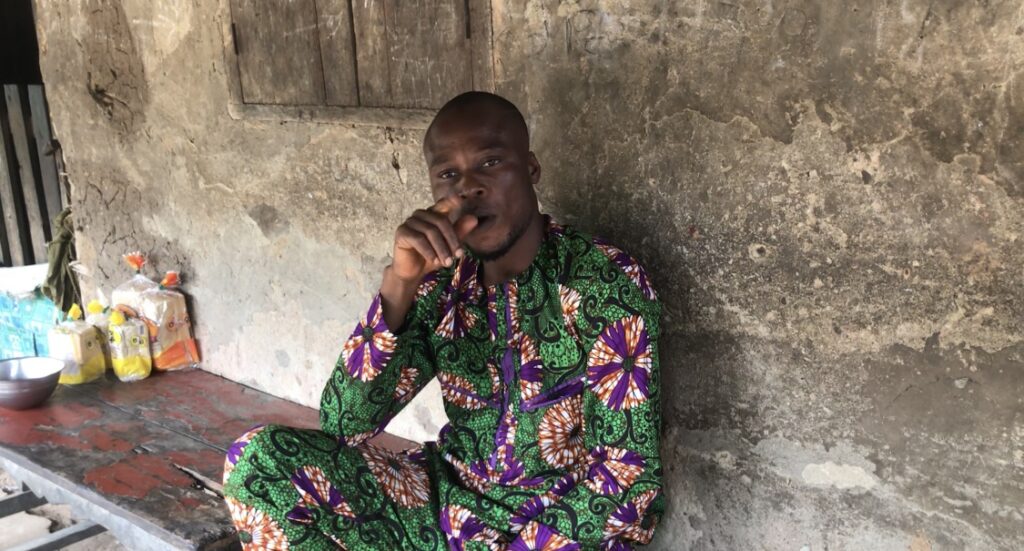At least 16 billion barrels worth $657 billion, according to the African Development Bank Group (AfDB), lie in Ondo State, in Nigeria’s southwestern axis. But the left-to-waste resource in southwestern Nigeria is polluting the region’s atmosphere and disturbing residents who bare its disastrous consequences. WikkiTimes’ BELOVED JOHN investigates…
Every morning, Simone Araromi’s little boys woke up with a dark-coloured gluey-like mess all over their bodies. The boys itched with fury, scratching to peel off the thick, semi-fluid substance that had tainted their skin.
The farmer was alarmed. The stains were difficult to wash off and on several occasions had left his boys with itchy bumps and small scaly patches.
But the liquid was everywhere in Araromi’s community — beneath the mango tree where the villagers clustered at sunset to the farmlands, to the root of plants in the ground and even inside water wells. It stained the lower reaches of walls on neighbouring huts, creeping out of the soil throughout the village and forcing its presence on everyone.
The substance seeped into Araromi’s boys’ rusty blue mat from the clay soil in the small brick house which had two tiny windows and a single room.
This continued for more than three years until Araromi could no longer bear it. In 2019, he cemented the floor in his single-room apartment with concrete, hoping it would be a lasting solution.
“It’s a black sticky liquid. It stained their mat and their skin all the time. We would cover it up with soil,” said Araromi. “But with time, it’ll come back up to the surface.”

The pervasive black material is bitumen, low-grade petroleum composed of complex, highly viscous hydrocarbons and Araromi’s room is set right atop a natural bitumen reserve.
His entire village of Ilubirin, in Odigbo local council of Ondo State has large deposits of hydrocarbon.
AN UNTAPPED, PROFITABLE RESOURCE
According to the Nigerian Geological Survey Agency and the Ministry of Science and Technology, Nigeria’s bitumen resources have grown to 42 billion barrels and are the sixth-largest reserve in the world.
At least 16 billion barrels worth $657 billion, according to the African Development Bank Group (AfDB), lie in Ondo State, in Nigeria’s southwestern axis.
However, this resource is yet to be explored for economic benefit.
This is despite the prediction by the Global Market Insights Incorporation that its market size would exceed $110 billion by 2024
Ironically, the government spends billions on importing bitumen, while 120km of bitumen lies fallow and untapped. 80% of the asphaltic materials used for road construction in the country were still being imported.
The AfDB has revealed that Nigeria spends N300 billion annually on importing the product. Data from the trend economy indicates that Nigeria spent over $116bn on importing bitumen products between 2014 and 2018. The country spent $13 million on bitumen imports in 2020 alone.
The Ondo State Commissioner of Environment, Sunday Akinwalere, said the delay in exploration denies the country the financial benefit of the substance. He added that the untapped bitumen could help strengthen Nigeria’s infamous bad roads and be used to construct new ones.
He noted that the villagers cannot do anything to effectively mitigate the contamination and that the federal government should step up to either relocate the residents to a safer location or teach them how to adopt methods that could curb pollution.
Akinwalere suggested AI farming, a form of agriculture that uses technology to ensure the health and productivity of crops and soil and the supply of water from safer sources outside the communities as ways to reduce the impact on the villagers.
Bitumen, also known as tar sand or oil sand, can be obtained naturally or as a residue from petroleum distillation. It’s notoriously difficult to extract from the ground, but may bubble up naturally to the Earth’s surface – and that naturally occurring rising is devastating communities in Nigeria.
AN ACHE THAT NEVER STOPPED
Made up of thatched huts and acres of farmlands, Ilubrin is a small community on the southern side of the state.
The village, dusty and warm, is situated far from the hustle and bustle of the city and shaded by palm and cocoa trees of different sizes.
One long stretch of road runs along the village, branching and bending here and there, giving birth to bylanes into the village. Deprived of most basic amenities including electricity, health centres, schools, and proper sanitation, poverty was visible in the atmosphere.
The villagers are predominantly farmers who rely mainly on the cultivation of cocoa, kola nuts and oil palms to make ends meet.
Like the others, Araromi has a vague knowledge of the substance but understands the discomfort of sharing his home with it.

As though the dearth of infrastructure in the community posed no difficulty, bitumen, like an angry feudal lord, had protracted their problem by polluting essential natural resources.
Direct contact with the material on the skin is unsafe but it became difficult, almost impossible to avoid when the black liquid surfaced in water.
All the wells in the village have been contaminated with bitumen. Like an emulsion, there’s a surface layer of black oil floating at the top of the water. The oil flowed out from the inner and outer walls of the wells, leaving black spots all over.
The villagers have to source clean water in villages situated kilometres away or draw from a well they consider less polluted.
But sometimes, even these options are unavailable and people have to use what they can find.
“This began one year before it started to appear on the land surface. It was about 8 years ago. The substance appeared in the stream and all water wells in the village and with this, access to potable water became a struggle.’’ Araromi explained

Araromi said the most worrisome aspect of the situation is the continuous threat to life. The septuagenarian is still mourning the loss of his friend whose death he believes was caused by polluted water.
The two men had known each other for over 20 years, frequently visiting and communicating with each other. They sometimes go to work together.
Although the friend, whom he identified simply as “Baba Iwo,” suffered from rheumatism for five years, Araromi is convinced that the constant exposure to pollution worsened his ailment. Before he died in 2020 at age 65, Babo Iwo had hives all over his body and an irritating sensation that made him scratch his skin scaringly.
Simone said his symptoms were similar to that of villagers who had also been exposed to the polluted water.
As Araromi explained, the polluted water caused his friend Baba Iwo, discomfort and soreness, and an ache that never stopped.
According to a study conducted by the Institute of Safety, Compensation and Recovery Research, exposure to bitumen either inhalation or skin contamination can lead to long-term health hazards. Bitumen is made of complex chemicals and exposure to the chemicals can lead to acute health effects such as eye, nose, throat, and skin irritation, nausea, and respiratory discomfort.
NIGERIA’S LARGEST BITUMEN RESERVE
The solid mineral present in Ilubirin village is also present in many other settlements in Odigbo and Irele local government area in Ondo.
Rasak Akinpelumi, 45, grumbled over the bitumen pollution that he endures with his wife and three children. His homeland is Agbabu, located only a few kilometres away, is an open swath of land with several muds and brick houses, and a population of over 8000 people.
Agbabu is regarded as the largest bitumen reserve in the country. But it is devoid of basic amenities. The locals, mostly farmers, and fishermen, have no access to standard health care, easy transportation, or electricity.
And just like the distant settlement, the toxic bitumen pollution compounds problems in Agbabu.
The villagers struggle for meaningful farm yields and access to potable water.
The two boreholes drilled to serve the community extract the same type of water found in the wells in ilubirin. The water was murky, and smelly and had obvious oil patterns and a cloying taste.
While those who can afford ‘pure water’ buy, the poorer population has no choice but to drink.
DISTRESSED FISHERMEN
According to the villagers, the most horrifying contamination experiences have happened in the last seven years – and it’s getting worse, not better.
The mud houses of fishermen stand next to Oluwa, the estuary that flows through the community of Agbabu and is regarded as an agricultural and economic source for the villagers.
For generations, the locals have fished, irrigated and drank from the Oluwa, until it, too, started showing signs of contamination. Bitum runoff had made its way into the cherished estuary.
So the river, once a wide stream of fresh water, became unsafe, eventually killing the aquatic life that its waters had long nurtured.
Fishermen suffered a serious blow.
Akinpelumi was one of them. His house is only a stone’s throw away from the river. He sits by his home, remembering the first time dead fishes floated on the water’s surface in numbers.

It was in 2015 after rain runoff washed the seepage from the land surface into the water. The incident occurred multiple times afterwards as bitumen was repeatedly washed into the water.
“Lots of fishes have died in that water, others ran away. They are all running away to a safer space.”
The fishermen in the area are poorer despite working all day and night.
“In the past, one can make about 50,000 naira from fishing per day. Now, I barely make up to 8,000 naira in a week,” he said.
A BURIAL GROUND FOR DEAD TREES
Harvest time in Odomode, a hamlet on the west of the estuary and about 20 km from Agbabu community, used to be the busiest and the merriest time of the year but not anymore. Instead, every year since 2012, the residents experience a harvest poorer than the last.
It is another harvest season in the village but there’s no crop to harvest. The farms are filled with dry brown leaves, dead plants, damaged trees, and the sob stories of sad farmers.
The head of the village, Isah Badmus, a short and slender man in his early 50s walked through his farmland. He grimaced each time he had to chop his dead crops along the way. The land looked like a burial ground for trees.

Disappointed about how the harvest had turned out, the sexagenarian was cold and sordid.
Most plants on his farm had failed to form edible fruits, leaving him with yields low relative to his expectation.
There will be very few crops left for sale after the portion for meals is taken out.
In the past, his compound would be occupied with farm produce, and his store filled as well. Now, he considers himself fortunate to have any crop ready for harvest.
“I have lost so much on the farm and it just keeps getting worse. Who would believe this was once a big cocoa farm? Every year, we are faced with a sticky situation and it is usually worse than the previous year,” Isah said, pointing at the empty Cocoa and Banana trees that dominated his plot.
Adjacent was a bitumen site sealed with a concrete slab and steel made in the shape of a chimney. The seal was made by the Federal government, as Isah would later explain, to mark the site and stop the bitumen from spilling out excessively.
The deposit might be worth a fortune but for Isah and his family, it is an immediate threat to their livelihood.
Isah explained that because the substance has grown closer to the land surface, it is impossible to cultivate anything that won’t be touched by the deposit.
Once the contact is made, the heat of the mineral kills the plant from the root. The most affected crops were kola nut, cocoa, cassava, and plantain.
Unable to resolve the situation and with nowhere else to go, the farmer has no option but to bear the difficulty.
READ: Tackling Climate Challenge: How Scavengers Contribute to Global Solution in Kano
However, according to Gbenga Okunlola, a professor at the University of Ibadan, who has been studying mining and solid minerals for over 15 years, residing in communities with bitumen deposits exposes people to diverse health risks.
He described the situation as a result of geogenic pollution that cannot be curbed. He indicated that the presence of the mineral makes this land uninhabitable for any living creature.
Okunlola said that the impact of the mineral will worsen as the soil weakens and the climate changes, noting that relocation to a safe environment and the provision of safe water sources for the villagers are the best ways to ameliorate the crisis.
Back in Ilubirin, Simone Araromi worries about the greater troubles that he believes are yet to come.
Readjusting his body on the wooden bench behind his small house, he considers how bitumen has nearly destroyed the land.
“The village didn’t have to worry about the product 15 to 20 years ago when it was beneath the ground, but as time passed that changed,” he said.
His future, and that of his neighbours, is uncertain.
“It is becoming more noticeable as the year passes and its impact even grimmer. We all wonder what our fate will be in the years to come, and what kind of harm and ugly experiences await us,” he said. “Everyone in the village is talking about it. We are suspecting it. I am terrified.”
This story was produced with support from Tiger Eye Foundation and the MacArthur Foundation.




